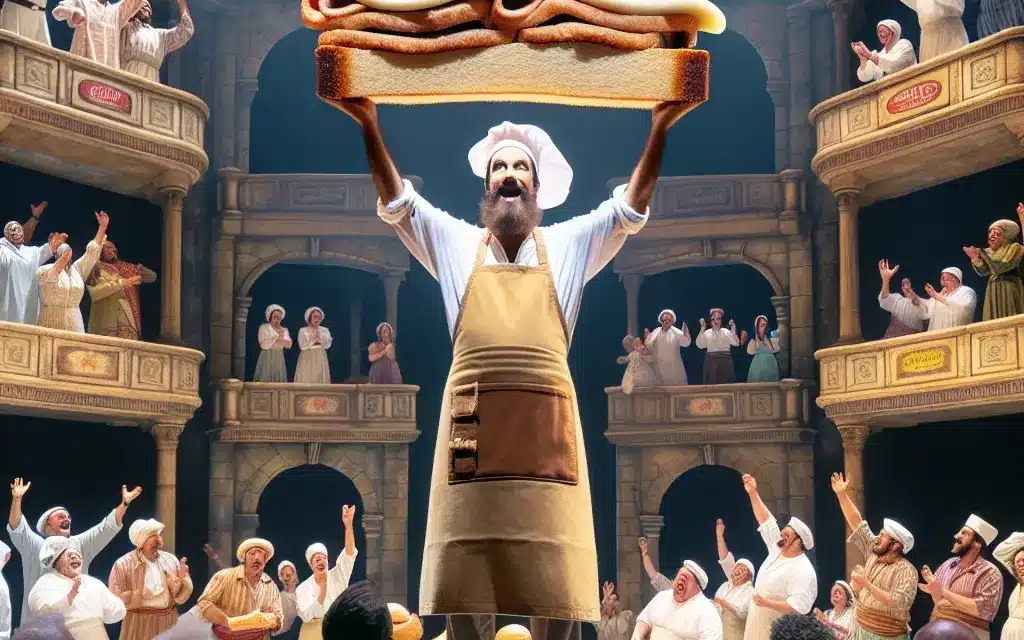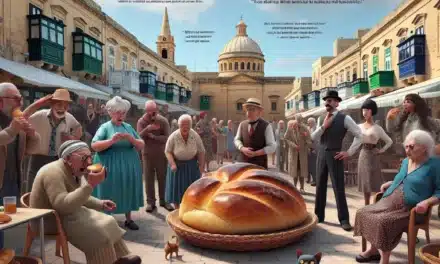The Epic Ħobż biż-Żejt Revival at the Muscat Theatre: A Crumby Situation
Act I: The Unlikely Protagonist
It was a sun-drenched morning in Sliema when the news hit the streets. The Muscat Theatre, tucked away in a narrow winding side street, had just announced an avant-garde play that promised to shake the very foundations of Maltese art and theatre. The buzz, though, was not about the play’s content but the leading man, Dunstan ‘Dunsi’ Zahra – a reclusive ħobż biż-żejt maker known for his elaborate sandwich creations. “Why is a sandwich maker headlining a play?” mumbled the puzzled patrons at Café Cordina in Valletta. Little did they know, Dunsi was about to slice into Maltese theatre history.
Act II: Enter the Critics
An assortment of critics and Maltese celebs descended upon the theatre, from the fashionistas of Mdina to the Instagram influencers of St. Julian’s. They had come to see a spectacle, and a spectacle they would receive—a full-blown musical centred around Maltese bread and its cultural symphony with tomatoes and tuna. The opening scene was mesmerizing, with Dunsi artfully smearing kunserva (tomato paste) across a giant ħobża projected onto the stage.
A Humble Start
The play began with Dunsi’s character, a simple baker from Gozo, singing of his dream to revolutionize ħobż biż-żejt. The crowd giggled as Dunsi practiced his sandwich sculpting, dreaming of a world where pastizzi and rabbit stew took a back seat to his beloved open-faced masterpiece.
Act III: The Great Umbrage of Gozo
The plot twist came when a notorious food critic, Carmenu “The Palate” Fenech, known for his fierce comments and love for all things deep-fried, took a mighty bite of Dunsi’s ħobż biż-żejt. The crowd gasped as Carmenu’s face turned from smug satisfaction to utter disbelief – it was, without question, the finest ħobż biż-żejt he had ever tasted. “This is it!” he exclaimed, “The future of Maltese cuisine!”
“You, my dear Dunstan, have officially outdone the pastizzi!” Carmenu declared, as the audience erupted in laughter and cheers.
The Twisting Bread Plot
The play’s climax featured Dunsi, now a celebrated culinary artist, battling it out in a cook-off against a villainous French chef intent on proving that baguettes were superior to Maltese bread. Battling with rolling pins and ominous loaves, Dunsi vanquished his opponent with a finishing move – The Għajn Qatet spread, named after Gozo’s mysterious water wells.
Act IV: The Bread Rises
The play’s denouement was as heartwarming as it was bizarre. Dunsi had transformed the once-crumbling Muscat Theatre into a thriving haven for the ħobż biż-żejt. It became a landmark more visited than the Azure Window before its unfortunate collapse – a sanctuary of crumbs and culinary delight. Tourists from all over the world began flocking to this outstanding performance of bread and bravado.
The Standing Ovation
As the curtain fell, the audience – Maltese and expats alike – rose in a thunderous standing ovation. Dunsi took to the stage one last time, holding aloft a king-sized ħobż biż-żejt sandwich, triumphantly declaring:
“Mela, ħobż biż-żejt for everyone! Uwejja!”
The applause was deafening, echoing through the streets and beyond, culminating in an impromptu parade led by the Mayor of Vittoriosa. As ħobż biż-żejt was handed out to the jubilant crowd, it was clear – Dunsi’s performance had not just revived the Muscat Theatre, but it had cemented ħobż biż-żejt as a symbol of Maltese ingenuity and a centrepiece of the island’s identity.
Epilogue: The Sandwich that Launched a Thousand Ships
Looking back on that day, the ‘Times of Mela’ fondly remembers how the Muscat Theatre went from a silent echo chamber to selling out every night, with each audience hoping for a taste of the action. Dunsi’s legacy lives on, for he didn’t just redefine an age-old dish; he redefined the very essence of Maltese theatre.
The critic, Carmenu “The Palate” Fenech, went on to publish his bestselling book, “Bread in Performance: The Crust of Maltese Culture.” And as for Dunsi, he disappeared shortly after the play’s hundredth performance, leaving behind only the scent of freshly baked bread and a legend that would rise, quite like dough, for generations to come.
Mela, that’s the tale of the Ħobż biż-Żejt Revival at the Muscat Theatre – a story that proves, with a bit of creativity and a whole lot of love, even the simplest sandwich can become the star of the show.
Uwejja, until next time, dear readers!







Recent Comments